
Signals Intelligence Linguists specialize in analyzing intercepted communications to extract critical information for national security. Proficiency in multiple languages, cryptographic systems, and advanced signal processing tools enhances their ability to identify patterns and decode encrypted messages. Their expertise supports intelligence agencies by providing timely, actionable insights that influence military operations and counterterrorism efforts.
Individuals with strong language skills and an aptitude for detail are likely suitable for a Signals Intelligence Linguist role, as it involves interpreting and analyzing foreign communications. Those who thrive under pressure and possess strong critical thinking abilities may find this job rewarding and manageable. People who struggle with high-stress environments or have limited language proficiency might find this position challenging.
Qualification
Signals Intelligence Linguist positions require fluency in target foreign languages such as Arabic, Mandarin, Russian, or Farsi, paired with strong analytical and communication skills. Candidates must possess at least a high school diploma or equivalent, with many employers preferring a bachelor's degree in linguistics, international relations, or a related field. Security clearance eligibility and prior experience in intelligence or military linguistics significantly enhance qualification prospects.
Responsibility
Signals Intelligence Linguists analyze intercepted communications to identify, translate, and interpret critical information that supports national security efforts. They utilize advanced language skills and cultural knowledge to decode encrypted messages and provide actionable intelligence reports. Their responsibilities also include collaborating with intelligence teams to verify data accuracy and enhance threat assessment capabilities.
Benefit
A career as a Signals Intelligence Linguist likely offers access to advanced technological tools and training, enhancing language proficiency and intelligence analysis skills. The role may provide opportunities for critical contributions to national security, potentially leading to a strong sense of purpose and professional fulfillment. Benefits often include competitive salaries, government job stability, and access to comprehensive healthcare and retirement plans.
Challenge
A Signals Intelligence Linguist is likely to face the challenge of rapidly decoding and interpreting complex foreign communications under time-sensitive conditions. The role probably demands maintaining high accuracy while navigating diverse dialects and technical jargon, which could test linguistic agility and analytical skills. Balancing confidentiality with real-time intelligence delivery might also pose significant operational pressure.
Career Advancement
A Signals Intelligence Linguist role offers significant career advancement opportunities through specialized language training and expertise in interpreting encrypted communications. Progression often leads to positions such as Senior Intelligence Analyst, Language Specialist, or Technical Advisor within defense and intelligence agencies. Continuous skill enhancement in foreign languages and signal analysis can accelerate promotion to leadership roles in national security operations.
Key Terms
Cryptologic Analysis
Signals Intelligence Linguists specializing in Cryptologic Analysis play a critical role in intercepting and deciphering foreign communications to uncover vital intelligence. They utilize advanced linguistic skills combined with cryptographic techniques to analyze encrypted messages, providing actionable insights for national security operations. Expertise in multiple languages and familiarity with cryptographic algorithms enhance their ability to detect patterns and anomalies within complex signal datasets.
Transcription and Translation
Signals Intelligence Linguists specialize in transcribing and translating intercepted communications to extract critical information for intelligence analysis. They convert audio and textual data from foreign languages into accurate, clear English transcripts that support military and national security operations. Proficiency in language nuance and technical terminology ensures precise interpretation of classified signals intelligence content.
Communications Security
Signals Intelligence Linguists play a critical role in Communications Security by intercepting, analyzing, and decrypting foreign communications to protect national security. They apply advanced linguistic skills and cryptographic knowledge to identify threats, decode encrypted messages, and support intelligence operations. Mastery of foreign languages and secure communications protocols enhances their ability to safeguard sensitive information from adversaries.
 kuljobs.com
kuljobs.com